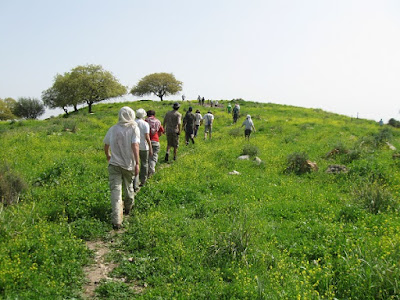 |
| Howard Blas (in the white shirt) meets soldiers with special-needs at the Palmachim Air Force base in Israel. With him is IDF Lt. Col. (Res.) Tiran Attia, director of Special in Uniform. |
By Howard Blas
In the Hebrew school of my youth, we took great pride in bringing a quarter each session to put in the blue and white JNF pushke. As Tu B’Shvat approached, we worked extra hard to raise money to plant trees in Israel. On our Hebrew high school trip to Israel, we took pride in actually planting trees with our own hands.
Fast forward more than 30 years, and I find myself blessed to share my love of Israel with young adults with developmental and intellectual disabilities. Every two years, my colleagues at the Ramah Israel Institute and I organize an Israel trip for a group of participants in the Tikvah special-needs programs from our various Ramah camps in the United States and Canada. On these trips, we learn and experience so much. One thing we have learned is that JNF is still actively involved in planting trees and dealing with Israel’s water resources, while also creating great programs to make sure people with disabilities are included in all aspects of Israeli society.






